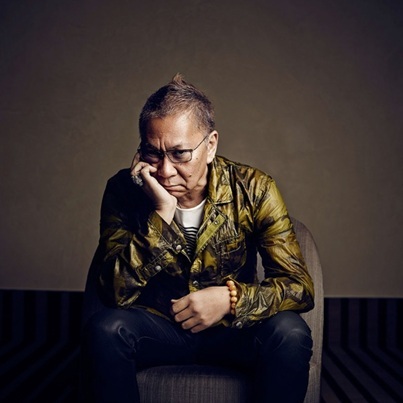
Takashi Miike (born August 24, 1960) is a highly prolific (and highly controversial) Japanese auteur. He takes his primary influences — David Lynch, David Cronenberg, and Paul Verhoeven — and turns their most transgressive elements up to eleven in many of his films.
He has directed several movies a year since his first release in 1991, as well as a handful of television programs, for an average of about 3-4 a year; starting soon after graduating Yokohama Vocational School of Broadcast and Film, where he studied under legendary Japanese filmmaker Shohei Imamura. Although the bulk of his work are theatrical releases, mainly Yakuza action films, he also produces a considerable number of Direct to Video V-cinema releases as well. The former are often used to finance the latter, which he claims he does because they allow him more creative control, and greater freedom from censorship and traditional narrative structure.
Both inside and outside Japan, he's best known for Black Comedy, over-the-top violence and Gorn, but his films cover a much wider range of genres and styles. Along with his signature action and horror, he's also produced examples of period dramas, sentimental road pictures, teen dramas, more traditional crime dramas, children's movies, and some that defy any attempt at labeling, such as the live-action/claymation horror comedy musical The Happiness of the Katakuris.
His V-cinema releases, despite frequent extreme depictions of violence and sexual perversion, are often philosophical explorations of the darker side of the human psyche.
He's also cameo'd as an actor and voice actor in various works, most notably as himself in No More Heroes 2: Desperate Struggle, which fits the tone of the game perfectly.
Compare David Lynch, David Cronenberg, Luis Buñuel, John Waters and Nicolas Winding Refn. Not to be confused with Takeshi Kitano, although both directors worked in Like a Dragon entries.
Some notable work:
- Ichi the Killer
- Audition
- Blade of the Immortal
- MPD Psycho
- Gozu
- The Great Yokai War
- The Bird People in China
- The Happiness of the Katakuris
- Sukiyaki Western Django, with a cameo by Quentin Tarantino
- Dead Or Alive
- Full Metal Yakuza
- Rainy Dog
- Yatterman
- Zebraman
- One Missed Call
- IZO
- The Masters of Horror episode "Imprint", which was pulled from its scheduled airing by Showtime because it was too extreme.
- Visitor Q
- K-tai Investigator 7
- Box, a short film that was part of Three... Extremes
- 13 Assassins
- Yakuza: The Live-Action Adaptation of the first game in the Ryu Ga Gotoku series, often called Like A Dragon.
- Gyakuten Saiban, known better overseas as Ace Attorney
- JoJo's Bizarre Adventure: Diamond is Unbreakable: Part 1
- The live action TerraforMARS movie.
- The Girls x Heroine! series, starting with Idol x Warrior Miracle Tunes!
- Yakuza Apocalypse
- First Love (2019)
Recurring tropes in Takashi Miike's filmography include:
- Author Appeal: Lactation and breast milk are recurring images in at least his V-Cinema releases.
- Gainax Ending
- Gayngster: Many of his Yakuza and other gangster types are either Straight Gay or Hard Gay. Possibly Author Appeal.
- Genre-Busting: His films tend to combines many genres at once. His film The Happiness of the Katakuris in particular blends so many at once it utterly defies description. Is it a Surreal Horror? a Musical? a Farce? It's equal parts of those really
- Gorn: Miike's movies are notorious for their goriness.
- Katanas Are Just Better
- Mind Screw: Audition and Gozu epitomize this trope.
- Refuge in Audacity: When describing his most notable films, the phrases "extreme", "transgressive" and "shocking" are thrown about liberally.
- Signature Style: His films are notable for their shocking scenes of extreme violence and sexual perversion, often portrayed in an over-the-top and cartoonish way. They have a lot of Black Comedy and push the boundaries of censorship as far as they can go.
- Surreal Horror
- Thematic Series: Some of his works a better taken as a group:
- The Black Society Trilogy (Black Triad Trilogy), which includes Shinjuku Triad Society, Rainy Dog, and Ley Lines. With Tomorowo Taguchi in leading (though different) roles in each, the films are not connected by a narrative. Instead, they focus on unlikely relationships among Yakuza crime families.
- There is also the Dead or Alive films, three films with wildly-different stories (with the only common point being the protagonists are played by Riki Takeuchi and Show Aikawa). Most of them tend to deal with how society divides people with similar motivations and character traits to fight for diametrically-opposed causes.
- Yandere: Especially in Audition. A wonderful deconstruction of kawaiisa.
